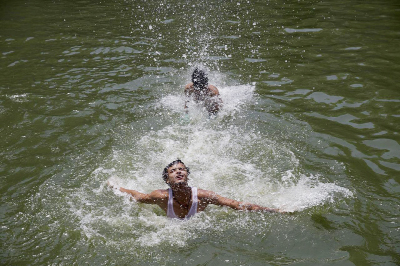
AP, New Delhi :
A city in western India has set a new heat record for the country – a scorching 51 degrees Celsius (123.8 Fahrenheit).
The record set Thursday in the city of Phalodi, in the western state of Rajasthan, comes amid a heat wave in India.
India’s meteorological department said the previous high was 50.6 Celsius (123 F), reached in 1956 in the city of Alwar, also in Rajasthan.
Authorities have issue a severe heat wave alert for the next two days in the western states of Gujarat, Rajasthan and parts of the central Madhya Pradesh. That means the areas can expect temperatures as high as 47 degrees Celsius (116.6 Fahrenheit) or more.
Meanwhile, Pakistani grave digger Shahid Baloch is taking no chances.
Like many people in the port city of Karachi, he was caught out by the severity of last summer’s heat wave which killed more than 1,300 people, and has hired a digger to excavate three elongated trenches big enough for 300 bodies.
“Thanks to God, we are better prepared this year,” said Baloch, 28, who works with three brothers at the vast Karachi cemetery run by the charitable organization Edhi Foundation.
When the heat wave struck in the summer of 2015, hospitals, morgues and graveyards in the city of 20 million people were overwhelmed, and drug addicts, day laborers and the elderly were the biggest victims of the searing heat. Temperatures hit 44 degrees Celsius (111 Fahrenheit), their highest since 1981 and above normal summer levels of around 37C (99F).
Intervention by the army and charity groups staved off an even worse disaster, locals said, but the crisis exposed the shortcomings of Pakistani emergency services in coping with environmental disasters that scientists say will become more common in the future.
Pakistan’s meteorological office is not predicting a repeat of last year’s extreme conditions, but, like Baloch in the cemetery, officials are preparing for the worst just in case.
“It will not get out of control the way it happen last year,” said Karachi Commissioner Asif Hyder Shah, adding that nearly 60 hospitals now have spare capacity for 1,850 heat wave patients.
Last summer patients slept on ward floors and long queues formed outside Karachi’s main state hospitals at the peak of the heat wave.
Shah said nearly 200 first response centers have been set up across the city, offering basic heat-stroke treatment to swiftly stabilize patients. There are also 700 makeshift relief centers, dishing out drinking water and rehydration salts.
A city in western India has set a new heat record for the country – a scorching 51 degrees Celsius (123.8 Fahrenheit).
The record set Thursday in the city of Phalodi, in the western state of Rajasthan, comes amid a heat wave in India.
India’s meteorological department said the previous high was 50.6 Celsius (123 F), reached in 1956 in the city of Alwar, also in Rajasthan.
Authorities have issue a severe heat wave alert for the next two days in the western states of Gujarat, Rajasthan and parts of the central Madhya Pradesh. That means the areas can expect temperatures as high as 47 degrees Celsius (116.6 Fahrenheit) or more.
Meanwhile, Pakistani grave digger Shahid Baloch is taking no chances.
Like many people in the port city of Karachi, he was caught out by the severity of last summer’s heat wave which killed more than 1,300 people, and has hired a digger to excavate three elongated trenches big enough for 300 bodies.
“Thanks to God, we are better prepared this year,” said Baloch, 28, who works with three brothers at the vast Karachi cemetery run by the charitable organization Edhi Foundation.
When the heat wave struck in the summer of 2015, hospitals, morgues and graveyards in the city of 20 million people were overwhelmed, and drug addicts, day laborers and the elderly were the biggest victims of the searing heat. Temperatures hit 44 degrees Celsius (111 Fahrenheit), their highest since 1981 and above normal summer levels of around 37C (99F).
Intervention by the army and charity groups staved off an even worse disaster, locals said, but the crisis exposed the shortcomings of Pakistani emergency services in coping with environmental disasters that scientists say will become more common in the future.
Pakistan’s meteorological office is not predicting a repeat of last year’s extreme conditions, but, like Baloch in the cemetery, officials are preparing for the worst just in case.
“It will not get out of control the way it happen last year,” said Karachi Commissioner Asif Hyder Shah, adding that nearly 60 hospitals now have spare capacity for 1,850 heat wave patients.
Last summer patients slept on ward floors and long queues formed outside Karachi’s main state hospitals at the peak of the heat wave.
Shah said nearly 200 first response centers have been set up across the city, offering basic heat-stroke treatment to swiftly stabilize patients. There are also 700 makeshift relief centers, dishing out drinking water and rehydration salts.

